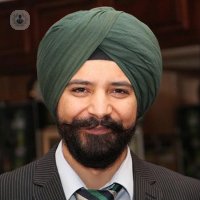Sports injuries: what you need to know
Written in association with:Sports injuries, whether acute or chronic, are sometimes extremely difficult to avoid. In our latest article, find out how sports injuries can be prevented and what treatment is available, as highly esteemed consultant orthopaedic surgeon, Mr Jagwant Singh, provides us with an informative insight into all things sports injuries.

What sports injuries are most likely to occur?
Shoulder joint injuries are the most common and occur due to racket sports, gymnastics, baseball, cricket and all sports which involve a lot of repetitive overhead activity. Common sports injuries range from collarbone fractures (clavicle), separation of the collarbone from the shoulder bone (joint sprain/disruption), shoulder joint dislocation and instability, and rotator cuff tears.
Roughly how many people in the UK suffer from a sports injury each year?
In the UK, around four per cent of the general population over the age of 40 would see their general practitioner in relation to a shoulder problem experienced as a result of sporting activity. Between one to one and a half million people in the UK report sports-related injuries each year, and it has recently been discovered that 18 per cent of referrals to accident and emergency are related to sports injuries.
How do sports injuries affect mental health?
They have a profound impact. You are resting and recovering and are not able to play with your teammates, which has quite a negative impact on your psyche. For people who want to play sports to be healthy, not being able to play and not being able to engage in that healthy lifestyle certainly has a negative impact on one’s mind.
How can sports injuries be prevented?
When we get involved in sport, it is important that we think about our posture and our technique when we are engaging in repetitive sports, so that we are not creating improper patterns of movement, which can lead to joint injuries and pain, especially shoulder joint injury and/or pain.
It is very important also to do warm-up exercises, and to make sure that if you injure yourself, you should seek help from a physiotherapist and that you rehabilitate your joint properly.
What treatment is available for sports injuries?
If the sporting injury has led to a fracture, or a dislocation of the shoulder, or a separation of the collarbone and the shoulder bone, they have to be treated as an injury that can be acutely fixed, especially if it is a displaced fracture.
If it is a dislocation of the shoulder joint (in a young person especially), intervention would certainly be required in order to prevent instability. If it is a separation of the collarbone and shoulder bone (if it is a minor grade one or two, where there is minimal separation), we can treat that non-operatively.
Any higher grades of injury require operative fixing. When it comes to non-operative management, it is important that the shoulder goes through the proper and necessary stages of rehabilitation. If it is a traumatic tear, you will require surgical intervention, but if it is a more minor grade of injury (tendonitis), that can be effectively treated non-operatively with non-steroidal painkillers, steroid injections, as well as physical therapy.
Mr Jagwant Singh is a highly reputable and skilled London-based consultant orthopaedic surgeon who specialises in sports injuries, amongst many other orthopaedic-related conditions and surgeries. Visit his Top Doctors profile today to book an appointment with him.



